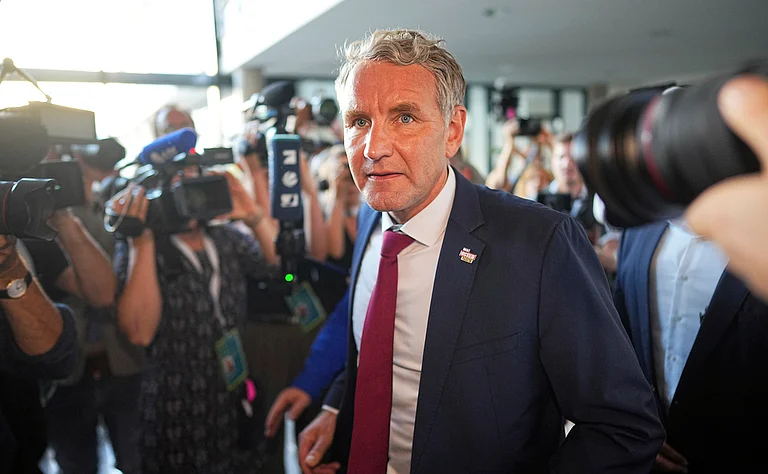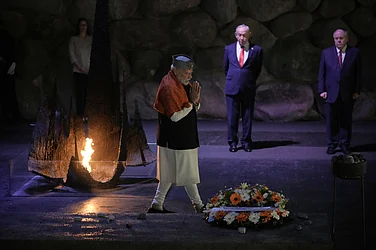Following the first-ever victory of a far-right party in Germany since World War 2 and Adolf Hitler's regime, Austrian voters have also chosen a similar path.
Preliminary results from Sunday's Austrian general elections showed a sharp increase in support for the country's hard-right parties. The far-right Freedom Party, led by Herbert Kickl, won a record 29 percent of the vote, marking the first time a party rooted in Nazi ideology has won since World War 2.
This far-right win in Austria has now streghtned the wave of far-right wins across Europe, especially during the European Parliamentary Elections held earlier this year.
Austria Sees First Far-Right Win Since WW2
The anti-migrant Freedom Party, also known as FPO, is regarded as a Russia-friendly and Eurosceptic. FPO held a slim lead over the current ruling centre-right party the Austrian People's Party (OVP) led by Chancellor Karl Nehammer.
As per the results declared, the Freedom party won 29.2 percent of the vote, as compared to 26.5 percent of the vote for the ruling People's Party.
"We've made Austrian history because it's the first time the Freedom Party is Number 1 in a parliamentary election, and you have to think how far we've come," said Kickl after FPO's historic win, which also comes seven decades after its formation in the 1950s by former Nazi lawmaker Anton Reinthaller.
The Social Democratic Party finished third and witnessed its worst result ever with 21 percent. The Greens, who are in a coalition with the OVP government also suffered a setback with just eight percent of votes. The liberal NEOS on the other hand, recorded over nine percent of votes.
Despite the historic win, the FPO led by Kickl has failed to secure the majority vote, paving the way fro the coalition. While the Freedom Party has been part of coalition governments before, incumbent Chancellor Karl Nehammer has stated the OVP will not join any government led by Kickl.
The Austrian Chancellor added that it will be “impossible to form a government with someone who adores conspiracy theories”.
Far-Right Win Sparks Concern
Taking the most recent win in Austria, Freedom Party's Herbert Kickl promised voters that if they handed him the win, he would serve as the Volkskanzler, or “people’s chancellor,” a moniker once used by Adolf Hitler.
Kickler has also vowed to form "Fortress Austria", which reflects his hard stance on immigration. Along with this, the FPO leader's high regard for Hungarian Prime Minister Viktor Orban is definitely expected to shake up Europe and the EU.
The Freedom Party's win also sparked protests as people marched against the "return of the Nazis" in Vienna. Adding to this, two days before the voting, party members were seen singing an SS anthem at the funeral of a former party member.
Right-Wing Resurgance In Europe
Since the start of election season, European countries have seen a shift towards the right parties. Starting from the Geert Wilders' right-wing victory in the Netherlands which led to the election of Dick Schoolf as Prime Minister to the shift to a centre-right French government, the far-right has certainly made huge gains in the continent.
While several European countries have right-led governments, such as Hungary and Italy, the European Parliament Elections of June 2024 highlighted the surge in voters for the far-right and its allies.
In Germany, for the first time since World War 2, a far-right party won the state elections. Alternative for Germany (AfD), which is a far-right and anti-immigration party, won in the eastern state of Thuringia and came in second in the state of Saxony.
In France, President Emmanuel Macron dissolved the parliament and called for snap polls after the EU Results in June showed a major win for a right-wing National Rally, led by Marine Le Pen.
In the first round of the snap polls, National Rally led by Le Pen and Jordan Bardella were projected to win. Shocked by the results, the left-winged parties in Paris formed a coalition and were able to block the right wing's win in the second round of elections.
However, despite the left win, France's government saw a shift towards the right after Macron appointed Michel Barnier as the new prime minister, which paved the way for a centrist-right legislation.
The shift towards a right-led Europe was highlighted during the European Parliament elections held in June 2024. With a focus on immigration, climate change, defence and the Ukraine war, the EU Election Results showed that the far-right parties had won in several nations.
With the surge in support for the far-right, the Green and Liberal Renew parties lost around 20 MEPs each. The shift to far-rights brought defeats to Germany, Austria, France, Slovakia and many other countries.
In Italy, Italian neo-fascist Giorgia Meloni’s rise to power was reflected in the EU Elections after her Brothers of Italy won with 28 percent of the vote share, making Meloni's party the largest in the European Conservatives and Reformists (ECR) alliance.
Furthermore, her stance on immigration and the conduct of the G7 Summit in Italy boosted her image across the nation and the globe.
The surge towards the far-right in Europe also reflects the rising discontent towards the European Union's existing laws on immigration, climate change, war, etc.
When it comes to the most pressing issue for the continent - the Ukraine War- a far-right win questions the regional bloc's unconditional support and assistance for Kyiv and is expected to impact Ukraine's bid for EU membership as well.


























